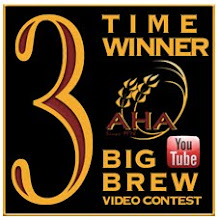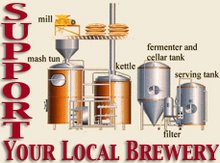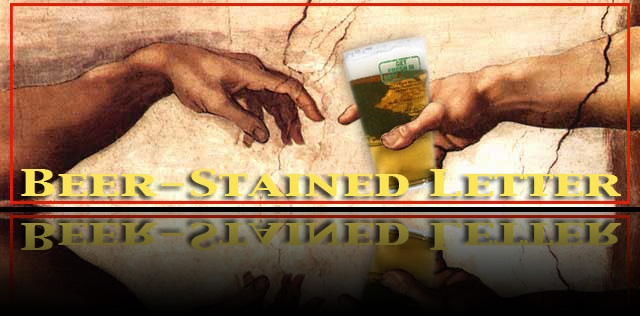Portrait of Prohibition
 For a while now, Victory Brewing across the Delaware River has trumpeted April 7th as a festive occasion, a moment to dance upon the grave of Prohibition and its crash 77 years ago.
For a while now, Victory Brewing across the Delaware River has trumpeted April 7th as a festive occasion, a moment to dance upon the grave of Prohibition and its crash 77 years ago.
Lo these many years hence, and amid the national craft beer craze, the folks over in Downington, Pa., have turned the demise of Prohibition into what is ultimately, after all is said and done, an annual marketing campaign, served with a shot of history, some special-occasion throwback-recipe beers, and release parties at bars whose locations are kept secret (sort of), à la speakeasies. "All citizens are urged to honor the day with a Victory beer" goes Victory Brewing's sloganeering.
April 7, 1933, of course, is the date upon which legal – albeit weak (3.2% alcohol by weight) – beer returned to the steins and mugs of US citizens. And it was the break from the starting gate toward ratification that December of the 21st Amendment, which essentially took a Sharpie and wrote Oops in giant, fat letters across the 18th Amendment, that action itself an unprecedented event.
Call it the Volstead Act, the Noble Experiment or the Terrible 13. But, really, whatever you call Prohibiton (1920-1933), just don't call it over and done with, since it left a lasting imprint upon American culture.
If you want to gain that understanding, peel back the many layers to what made America go dry and really dig into an issue that was seismic (yet has often been distilled into jejune retellings), then check out Daniel Okrent's Last Call, The Rise and Fall of Prohibition.
A fresh, in-depth account of the era, Last Call is a perfect book for craft beer enthusiasts, the kind of folks whose thirst for better beers runs parallel with their appetite for knowledge, their need to delve deeper.
Okrent graciously fielded some quick questions via email this week for a Q&A here.
BSL: Why do we as a culture harbor an oversimplified, even romanticized view (i.e., gangsters and speakeasies) of Prohibition? Is it truly because of the cinematic retellings and because, as history, it’s served to us in a shot glass when to really understand it, it calls for a pitcher?About Daniel Okrent
DO: What most Americans know about Prohibition was delivered in abbreviated, romanticized, and dumbed-down packages – i.e., in Hollywood films and television shows. The Untouchables bears as much a relationship to the reality of Prohibition as The Flintstones has to the reality of the Stone Age.
BSL: We were once truly a country of irresponsible drinkers ... how does that shape our attitudes toward legal drinking today?
DO: I'm not sure it does; our historical memory is awfully weak. In 1830, the average American over 15 years of age drank the equivalent of 90 fifths of 80 proof liquor annually; today, we drink barely a third of that. Comparing the two eras is almost impossible.
BSL: Prohibition’s effects go far beyond the three-tier system of legal booze under which we enjoy a cocktail nowadays. Given that, what’s the most dramatic or central thing from it that continues to touch Americans' lives today?
DO: It's probably something as simple as the mixed drink. During Prohibition, the quality of illegal liquor was so dubious that it became necessary to dilute the goods with tonic, orange juice, ginger ale – anything that would mask the wretched taste of the booze itself. The other: men and women drinking together. The pre-Prohibition saloon was a men-only sanctum; the Prohibition era speakeasy was open to all comers, and really introduced mixed-sex social drinking to much of America.
BSL: Does Prohibition represent the pinnacle of government interference? And if that’s true, then why don’t we hear it used (or see it widely used) as an example to argue against government interference. For instance, you don’t really hear Republicans ripping on Democrats right now, saying their ideas will be as meddlesome, troublesome and ultimately fail like Prohibition did.
DO: I can't think of a greater intrusion into the lives of the average Americans than Prohibition. But you don't hear politicians citing it today because it was so extreme, and such a failure. Its current political relevance appears most vividly in the arguments over marijuana legalization, such as the ballot measure Californians will be voting on in November.
BSL: Does today’s Tea Party movement and the forces that surround it mirror any elements of the Prohibition movement? Are we witnessing similar political skirmishes and class wars and encountering similar personalities driving the debate?
DO: There's some similarity, primarily in the us-against-them nature of the political battles – they're not just about specific issues, but really about who is going to control the country. On the other hand, the Prohibitionists succeeded because, unlike the Tea Party, they confined themselves to a single issue. The closest analog today would be the National Rifle Association, which doesn't care what a politician thinks on any issue except gun control. And I believe that unrelenting focus is why the NRA is the most successful, in their own terms, of today's political organizations.
A writer, editor and baseball historian, Okrent is credited as the originator of Rotisserie League Baseball. He's the author of Nine Innings; The Way We Were: New England Then, New England Now; Great Fortune: The Epic of Rockefeller Center; and the collection of his New York Times columns as Public Editor #1, a look back at his stint as the Times' first ombudsman, when he was called upon to help repair the newspaper's credibility following the Jayson Blair plagiarism/fabrication scandal that bubbled up at the Times during the spring of 2003.













